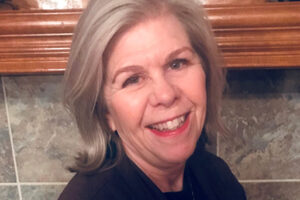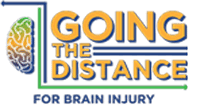 2021 HONOREE: TERRI KERN
2021 HONOREE: TERRI KERN
Despite receiving a life-threatening brain injury in 2008, Terri leads a very full life. She is a home maker, prayer warrior and avid volunteer and a deserving Honoree for the 2021 GTD for Brain Injury Run.
On April 28th, 2008, Terri Kern, a devoted wife and busy mother of five, left her house for a routine jog in the neighborhood. In an instant, Terri’s life was forever changed. Terri was struck by a car while jogging, and she was thrown 35 feet into the air.
Initially Terri was conscious after the accident. She answered questions for responders as they rushed her in an ambulance to a nearby hospital. Terri’s husband, Mike Kern, met her at the hospital upon arrival. In those first moments, Mike and the doctors thought Terri was going to be okay. Then suddenly, with Terri’s husband standing by her side, Terri recalls, “the room went black.” She lost her vision and all bodily functions.
The doctors rushed her into a CAT scan. The scan revealed that she severed her carotid arteries. This limited the blood flow to Terri’s brain and caused stroke activity on both sides of her brain—to which she lost 95% of blood flow for a period of time. Doctors moved Terri to the Trauma Center, but the hospital was unable to treat brain injuries of this magnitude.
Through a family friend, the Kerns were connected with a prominent neurosurgeon in the Kansas City area. The neurosurgeon was traveling for a conference, but he advised Terri’s transfer to another hospital nearby. Unfortunately Terri’s situation continued to decline after the transfer, but the medical staff on hand didn’t have solutions. Her husband and children, ranging in age from 6 to 16 years, watched at her bedside as she slipped into a coma and began to wither away before their eyes. Clots, strokes, internal bleeding and loss of oxygen… the prognosis was extremely grim. A backup artery had “kicked in” and was keeping some basic functions viable, but it would never last. Doctors prepared Terri’s family for the worst. Extended family members flew in because they didn’t think Terri was going to survive. Terri’s family is deeply rooted in faith. They prayed for a miracle.
As Terri’s condition worsened, Mike contacted the neurosurgeon who first advised them. He was still in Chicago at the conference but offered to return early and provide treatment. However, Terri would need to change hospitals in order to receive his treatment. In the most stressful decision of his life, Mike Kern, agreed to move Terri. The other doctors didn’t think Terri could survive the transfer and advised Mike against it. However, this decision likely saved Terri’s life.
Their neurosurgeon quickly put together a plan to “save the brain” (in his words) by increasing her blood pressure and thinning the blood at the same time. It was a risky plan as it could have caused Terri to bleed out. Additionally, Terri had an allergic reaction to the blood thinner and required a blood transfusion. The plan was not easy and not without setbacks, but it eventually worked. Terri’s situation began to improve. Terri was still connected to both a feeding tube and a ventilator—but she was going to survive! Even her neurosurgeon thought Terri’s survival was nothing short of a miracle.
Terri was moved to the rehabilitation floor and began the recovery process. In her waking moments, Terri thought the doctors were over-reacting when they told her about the injury. She couldn’t remember the accident or comprehend the extent of her damage. To Terri’s surprise, she would have to re-learn everything she ever knew—starting with the most basic tasks of feeding, sitting, bathing, walking and talking. Terri struggled from moment to moment throughout each day. Everything she once did effortlessly was now painstakingly difficult.
Yes, Terri received a second chance at life, but in the months to follow, Terri was in a diminished body. Her life was merely a semblance of what it once was. The situation took a tremendous toll on Terri’s entire family. For the time being, her children had lost their mother. Her husband and kids had to instantly navigate daily life without Terri. Extended family and friends helped as much as possible, but there is no substitute for the care and tending of a mother like Terri.
In June 2008, Terri was sent home from the inpatient rehabilitation center of the hospital. Although her struggles were far from over, she exceeded expectations. (Doctors originally predicted she would be in the hospital until November.) Returning to the “real world” was more difficult than anyone could have imagined. Terri was still a long way from “normal” or being her old self. She was accustomed to taking care of everyone; it was her life’s purpose. Now Terri was the one needing all the care.
She worried about being too much work or trouble for her loved ones. Upon moving home, Terri spent all her days (9 AM – 4 PM) at an outpatient rehab facility. Rehab was a full-time job involving speech therapy, occupational therapy and physical therapy. The work was draining, but Terri enjoyed being at rehab. She was surrounded by others like her, and she felt a sense of purpose and accomplishment. Over time, Terri eventually regained all her skills and even learned to drive again.
In 2017, Terri and her husband hired a ghost writer to compile their experiences into a book: Moving Mountains – Discovering Joy through Suffering. Through their book, they hope to inspire other survivors of brain injury. The book also ensures they will never forget this period in life and how faith carried them through everything. During interviews for the book, Terri’s children were allowed to speak openly about the hardship after their mother’s accident. This was difficult for Terri and Mike to hear, but they agreed it was important to share all truths about the experience. The survivor is not the only one deeply affected by a brain injury. The entire family suffers and must persevere.
Their book highlights the difficult role of the spouse—as caretakers can be overlooked during these traumas. Mike Kern’s entire world was turned “upside down” in an instant. For months and even years following the accident, Mike was the main caretaker to his wife and family. At the same time, Mike was also dealing with the ongoing demands, changes and stresses of a professional career. Even years after the accident, Mike still participates in a monthly caregivers’ support group.
It’s been more than 10 years since the accident, and Terri still lives with daily challenges. From an outsider’s view, Terri appears completely fine. There are no outward signs of her injury. However, Terri still deals with coordination and balance issues. Her side vision is restricted in both eyes. Simple tasks require pause and thought before she does them. Sometimes she still has problems with impulse control when she speaks (her brain’s “filter” doesn’t work as well). Terri has a difficult time making decisions, doing certain physical activities and gets overwhelmed by large crowds. One of her daughters was recently married, and she hired a wedding planner to coordinate all the details. (This is something Terri could have easily handled before the accident.) At times when Terri’s family is together, she feels like an observer instead of a participant depending on the activity.
She and Mike still have one daughter living at home—who is a senior in high school. Terri and her husband recently purchased a new house on Lake Creekmoor in Raymore, MO. She looks forward to this next chapter in life… creating a new home, spending more time outdoors and even learning to golf. Terri is extremely thankful for her devoted husband, children, faith and community. To use an excerpt from Terri’s book: ”It is by the sheer grace of God that I survived, that I had the will to fight, that I had the faith to keep going, and that we were surrounded by so many loving and supportive people along the way.”
ABOUT BIAKS
A NONPROFIT
Brain Injury Association of Kansas and Greater Kansas City (BIAKS) is a 501(c)(3) nonprofit organization, whose mission is to improve the quality of life for those affected by brain injury.
ABOUT THE
MEMORIAL DAY RUN
The first Memorial Day run was held in 1988 honoring Amy Thompson, a young woman whose courage, forgiveness and will to live gave hope to all affected by brain injury.
OUR SPONSORS
BECOME A SPONSOR
Promote your business or organization and support those affected by a brain injury. Contact amccarter@bia-ks.org
or click the link below.


